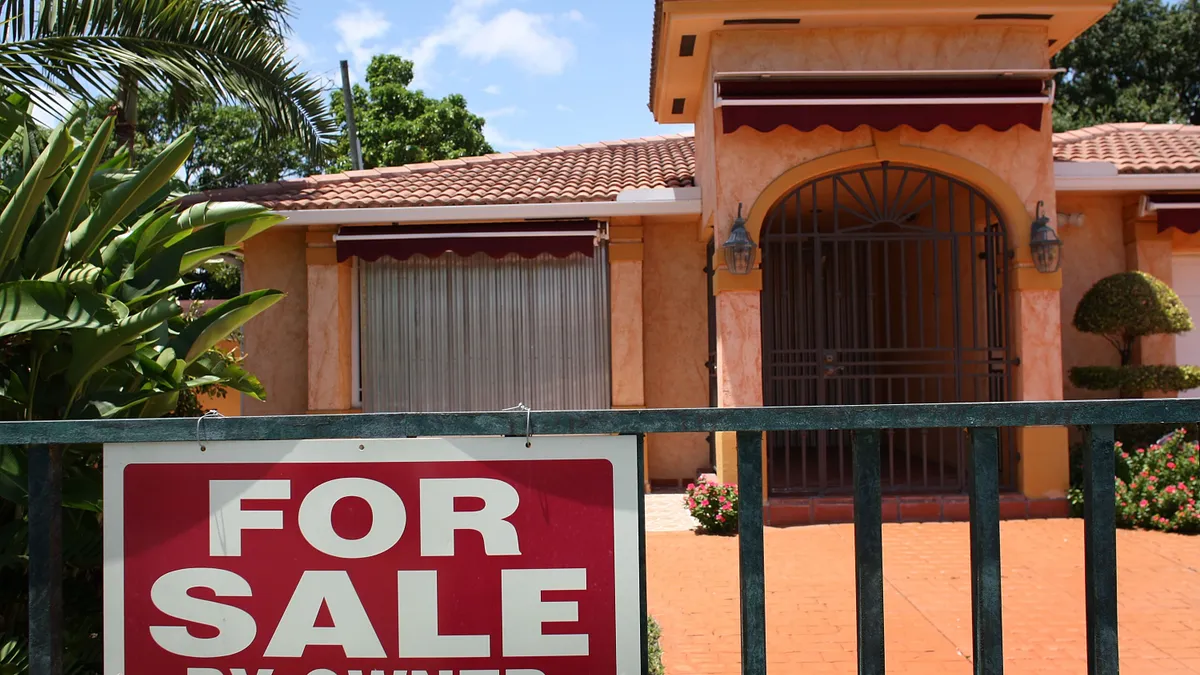Home builder CFOs detailed continued headwinds from material price bumps, lingering supply chain challenges and persistent inflation on second quarter earnings calls — as they are also adjusting to a more cost-conscious group of potential buyers.
The number of existing homes for sale and the price for such homes has slowly ticked up as consumers, also facing inflationary pressures, step back. August data from the National Association of Realtors shows existing home sales tumbled by 5.9% in July from June, decreasing for the sixth consecutive month. The inventory of unsold homes, meanwhile, rose to 1.3 million by the end of July.
Financial executives in the residential real estate space are feeling the pressure — home construction company Lennar Corporation Chairman Stuart Miller noted the company recognizes “inflation continues to be a legitimate threat” during the firm’s Jun. 21 second quarter earnings call.
The uncertain market conditions also made it difficult to provide more targeted guidance for the coming year, CFO Diane Bessette said on the call, though the company expects average sales prices for the third quarter to be slightly above averages for its second quarter — an average of $483,000, she said.
Revenue from home sales surged by 33% for the company during the second quarter to reach $8 billion, compared to the $6 billion seen in the second quarter of 2021 per the company’s earnings results.
Rumblings in the multi-family sector also impacted Lennar during the quarter, however, with the company reporting operating earnings of $0.7 million for multi-family during its second quarter, compared to $22.4 million in the second quarter of 2021. Lennar expects earnings in its multi-family sector to reach $20 million in its third quarter, Bessette said during the company’s second quarter earnings call.
Inflation may also be causing investment opportunities in multifamily to narrow, with Freddie Mac’s Multifamily Apartment Investment Market Index (AIMI) falling by 11.7% in the second quarter, a 17.9% decrease compared to the same quarter in 2021. Property prices which are growing by 21.8%. according to Index data released Thursday.
Economic pressures increased supply of homes for sale
Home builder Hovnanian Enterprises also reported an increase in quarterly revenue despite inflation’s impact, with total revenues increasing 11.1% to $767.6 million for the company’s third quarter, per its Sept. 1 earnings results.
However, the company also pointed to inflation as one of the factors behind a 27% increase in the gross contract cancellation rate for consolidated contracts in the third quarter. Inflation, year-over-year home price increases, and fears over a recession all played a role in this spike, per the firm’s earnings release.
Company executives were also quick to dismiss increasing homes for sale figures, with company CEO and Chairman Ara Hovnanian stating economic uncertainty has only led to a temporary pause by home buyers while they wait for the market to cool the company’s earnings release.
Furthermore, while there has been an uptick in potential homes for sale, what analysts and press “fail to mention is the modest absolute increase is from record low levels,” CFO J. Larry Sorsby said during the company’s third quarter earnings call on Sept. 1.
“If you ignore the COVID housing surge during 2020 and 2021, we are at the lowest level of existing homes for sale in four decades,” Sorsby said according to a Seeking Alpha transcript, noting that the current number of homes to be sold would “almost have to double” to get back to the historical average.
Companies brace for rising labor, material costs
Others have reported dips in homes sold, with Pulte Group showing increased homebuilding revenues for its second quarter despite a small decrease in the number of homes closed, for example. Yet the more meaningful effects of inflation were reflected in the firm’s labor and material expenses, according to a review of their second quarter earnings results.
The group reported home sale revenues of $3.8 billion for the quarter — an increase of 18% year-over-year, according to the company’s earnings results. Meanwhile, it closed 7,177 homes for the quarter, a 1% dip year-on-year. Average sales price ballooned by 19% in the quarter to reach a $531,000 average.
CFO Robert O’Shaughnessy said during the company’s second quarter earnings call on July 26 that the increase in average selling prices “primarily reflects strong demand and pricing conditions across all buyer groups” for the back half of last year.
The average increase in selling price also occurred as inflation continues to badger labor and material costs. O’Shaughnessy pointed to inflation’s impact on such expenses as well as to lingering supply chains that have continued to impact production, stating he would use the word “fragile” as a descriptor for overall conditions.
Pulte Group has also experienced “meaningful” inflation when it comes to labor and costs of materials, including lumber, he said.
“Although lumber has decreased again, which will impact our 2023 closings, we've continued to experience incremental house cost inflation as the year has progressed,” O’Shaughnessy said on the earnings call. “Based on our most recent internal estimates, we now expect house costs for the year to be up 10% to 12% over last year.”




















